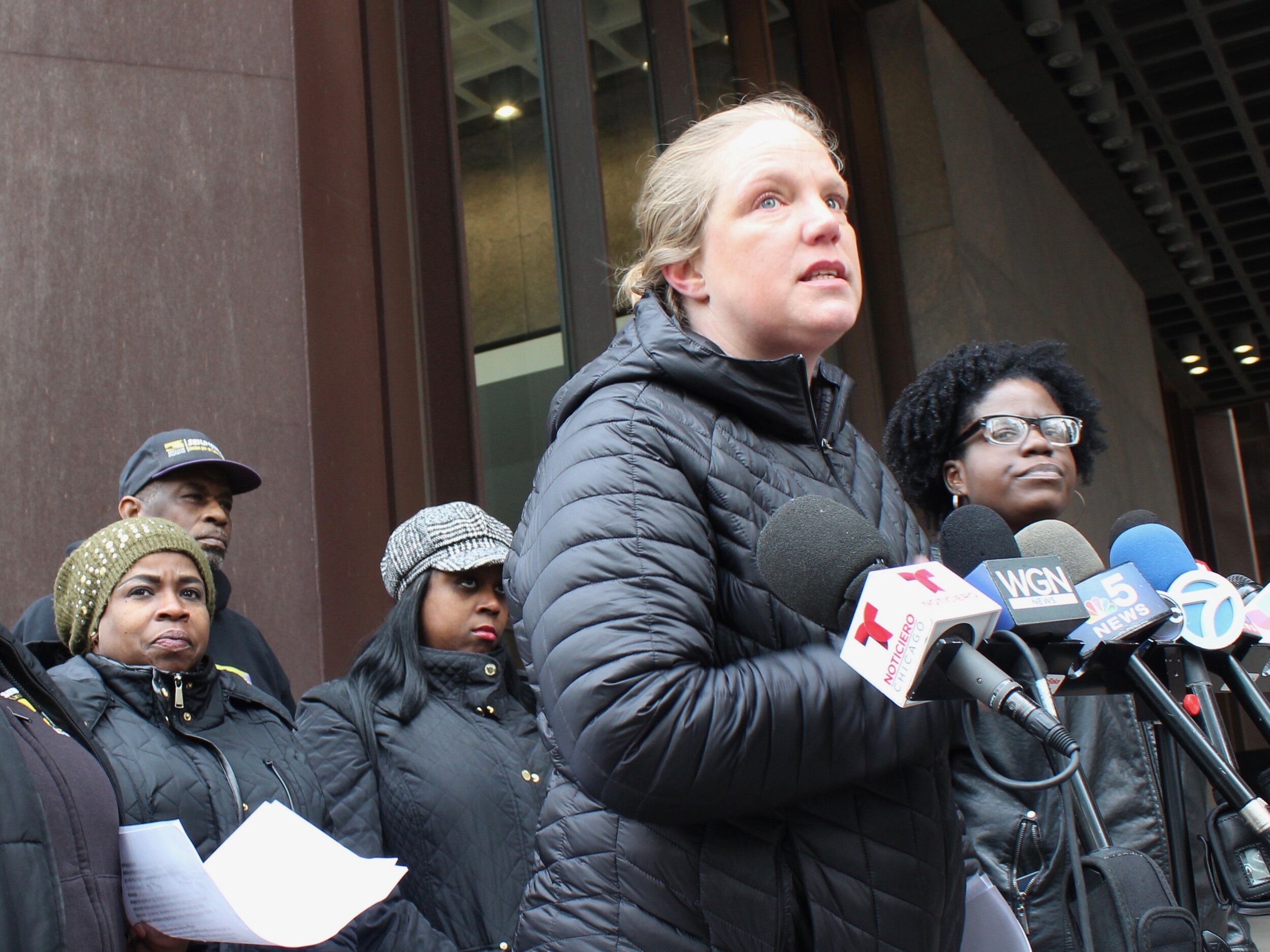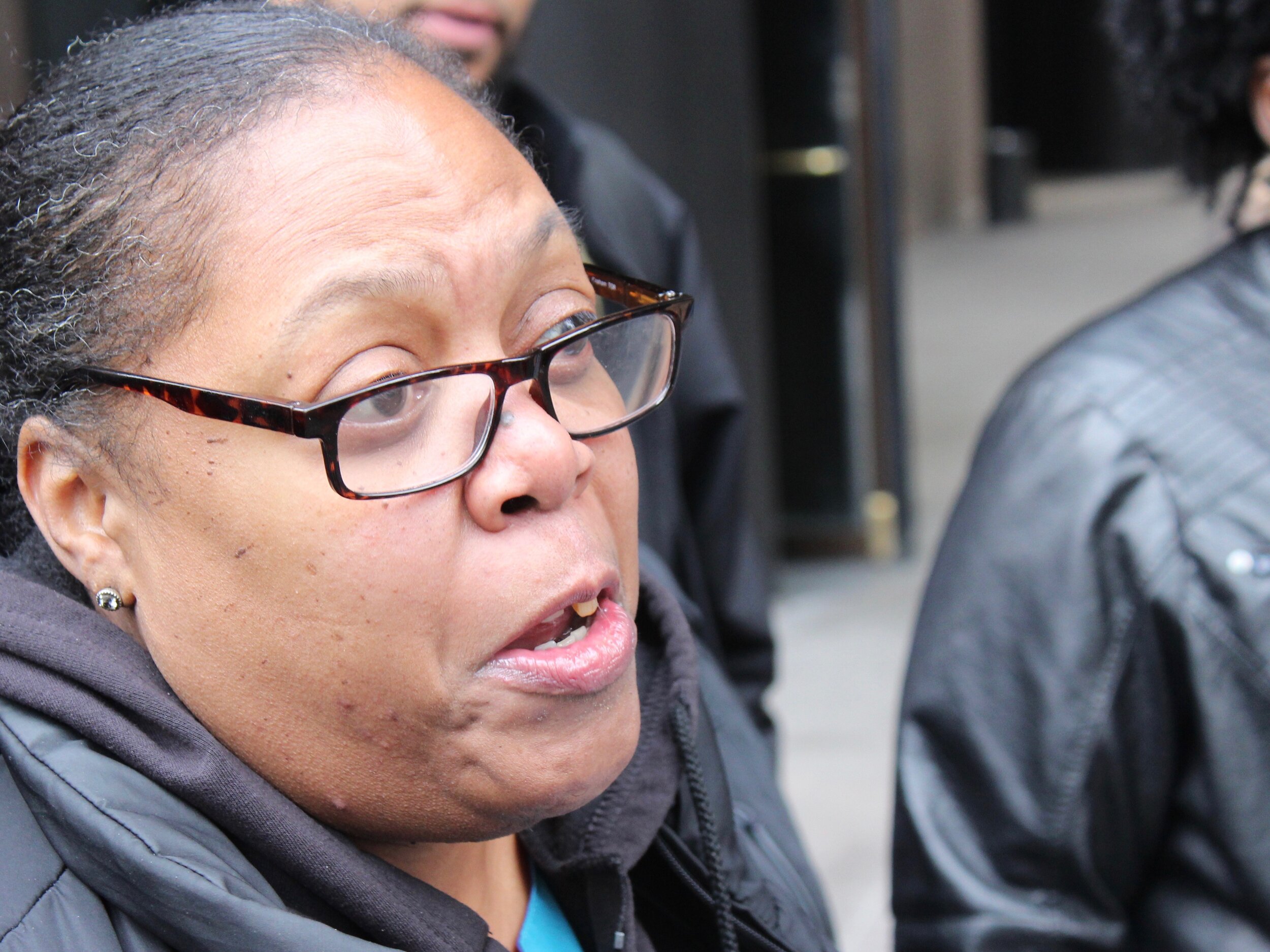Hospital workers demand paid sick leave for coronavirus
‘Frontline’ staffers also call for clear protocols in dealing with COVID-19
Anne Igoe of SEIU Healthcare Illinois leads a news conference Thursday outside the offices of Northwestern Memorial Hospital in Chicago. (One Illinois/Ted Cox)
By Ted Cox
CHICAGO — Hospital workers on Thursday called for extended paid sick leave and clear protocols in dealing with the coronavirus.
Workers held a news conference outside the offices of Northwestern Memorial Hospital in Chicago to urge one of the state’s top medical facilities to lead by example in adopting the policies at very least during the COVID-19 outbreak.
“The spread of the coronavirus has made one thing clear,” said Anne Igoe, vice president for hospitals with the Service Employees International Union Healthcare Illinois. “The working conditions of frontline health-care workers in hospitals and other settings has a direct connection and impact on public health.
“We don’t feel our city is ready” to confront the outbreak, she added. “We have concerns.”
“Currently, Northwestern punishes us for taking time off or being sick,” said Anita Strode, a patient caretaker who works in a heart ward at Northwestern. “When we get sick, we have to choose between working sick and hoping we don’t get anyone else sick or going without a paycheck and not having enough money for bills or rent or groceries or anything else.”
“When we get sick, we have to choose between working sick and hoping we don’t get anyone else sick or going without a paycheck.”
Anita Strode (One Illinois/Ted Cox)
Igoe pointed out that’s risking disaster in the midst of an infectious outbreak like COVID-19. “We need an extension of paid time off,” she said.
Thursday’s news conference detailed the plight of hospital workers beyond doctors and nurses, such as certified nursing assistants, housekeepers, and food and nutrition workers. “These are the front line of health care here in the city of Chicago,” Igoe said, adding that many are low-wage workers with starting pay set at $14 an hour. “They are as important as our doctors and nurses,” and in some cases almost equally at risk for transmission of the virus. “We need to have the same protections on the job.”
The union is calling for hospitals to adopt the policy of telling workers with a cough or fever to stay home, offering at least 15 days of paid sick leave, as well as “making provisions to have all employees exposed to COVID-19 go into quarantine,” which typically lasts two weeks.
“It’s not possible for low-wage workers to take 14 days off of work unpaid,” said LeChrisha Pearson, a certified nursing assistant at Mount Sinai Hospital in Chicago. “When you live paycheck to paycheck, like most of us do, you can’t give up two weeks of pay. Two weeks of pay missed can mean an eviction notice, it could mean no food on the table for your children, it could mean no lights or gas.”
The union also is calling for clear protocols to be stated on the treatment of COVID-19 patients, as well as training on the proper use of medical devices and materials. According to Igoe, some hospital workers have been told to look up proper use on the internet or call a product’s help line. “Members need to be trained,” she said.
“With the coronavirus, it’s more important than ever for hospitals to practice good infectious control procedures and policies,” Strode said. “We do not know the protocol.”
Northwestern issued a statement saying: “Northwestern Medicine is working closely with the (Centers for Disease Control) and local and state health authorities in responding to the COVID-19 pandemic. The safety and protection of our patients and staff is our highest priority. We have established internal and external online resources that provide the latest clinical guidelines for our health-care professionals and staff. We continuously provide real-time communication, training, and infection-prevention protocols in support of all of our frontline workers as we manage this global health crisis.”
The hospital said some of the issues are being raised in ongoing contract negotiations with the union, including higher wages, adding, “We fully understand that it is not beneficial to our patients or workforce if employees come to work ill and have policies in place, including sick leave, to support this. We have established policies for employees who miss work under these types of situations and we continue to evaluate our policies and procedures for all employees in our health-care system in this ever-changing environment. If any employee does test positive for COVID-19 due to exposure at work, employees would be paid through our compensation program.”
“Northwestern should be leading on this,” Igoe said, “not waiting for the CDC, not waiting for the state of Illinois to require these things.
“We are asking all hospitals to adopt the policy of cough and fever, do not come to work, and no employee shall be punished,” she added. “We are asking all employers in the city and the entire state to extend 15 days of paid leave off if there is a family that needs to self-quarantine.”
U.S. Sen. Tammy Duckworth introduced a bill Thursday calling for the Occupational Safety and Health Administration to set fresh standards specifically addressing the unique challenges presented by the coronavirus outbreak. “Our nation’s health-care workers are on the front lines as we work to defend Americans from COVID-19,” she said in a statement. “They deserve to be as protected as they can be as they take on greater risks to keep the rest of us safe, and this legislation will help ensure they are.”
Her senior Senate colleague Dick Durbin co-sponsored the bill, saying, “Sen. Duckworth and I are extremely thankful to the health-care workers who are on the front lines of this coronavirus outbreak. And it is imperative that we do everything we can to help keep them safe and healthy as they fight this pandemic, and this bill will help do just that.”
The Democratic presidential candidate Sen. Bernie Sanders of Vermont was among those joining in co-sponsoring the bill.


